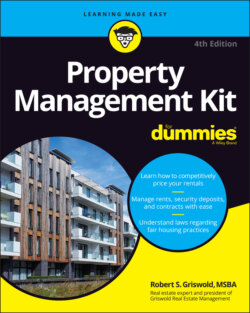Читать книгу Property Management Kit For Dummies - Robert S. Griswold - Страница 79
Using a new lease or rental agreement
ОглавлениеWhen you’re taking over an occupied rental property, you always want to transfer the tenants to your own lease or rental agreement as soon as legally practical. The sooner you begin to convert your new property to your rental contracts, the better. If your policies are markedly stricter than the previous owner’s, you may find the transition period to be difficult. For a single-family rental or a small rental property, implementing your own rental agreement as soon as legally allowed is relatively easy. For a larger rental property, you may want to transition to a new contract gradually upon tenant turnover. Regardless, establish uniform policies for all your tenants to avoid any possible fair-housing violations. (Find out more about fair-housing laws in Chapter 11.)
Your tenants already have one of the following:
A valid written lease
An expired written lease that has become a month-to-month rental agreement
A written month-to-month rental agreement
A written rental agreement for a period of less than a month
A verbal agreement
Your ability to implement your own lease or rental agreement will be affected by which agreement is currently in force with any existing tenants. You have to honor a written lease until it expires. If your tenant has an expired lease that is now a month-to-month rental agreement, or they are already on a month-to-month rental agreement, you can transfer your tenant to a new rental contract upon 30 days’ written notice. A verbal agreement can be changed at any time.
Although you may want to make some changes in the terms or policies of your tenants’ current leases or rental agreements when you acquire an occupied rental property, your legal and business relationship is established by whatever agreement the tenants had with the former owner. Wait until the contract’s expiration to change the terms — or provide the tenants proper legal notice of any proposed changes.
Be extremely careful that your new lease or rental agreement fully complies with current state and local laws. This warning may seem to be obvious, but residential landlord–tenant laws in many states and even local jurisdictions change constantly, especially since the pandemic. If you attempt to use a lease or rental agreement from another state or even another jurisdiction within the same state, or one that hasn’t been reviewed recently by a landlord–tenant legal professional, a court might determine that your lease is illegal and unenforceable, which could be a very expensive lesson. Never use leases or rental agreements that you find online (including the ones that I’m sharing with you) without having a landlord–tenant legal professional review the lease or rental agreement.
The tenant information the seller provided you during escrow may be outdated. One quick way to update your records is to have the tenants voluntarily complete your rental application form. In many states, you may not have a strong legal argument for requiring existing tenants to provide this information, but many tenants will understand your reasoning and not mind. Other tenants may be reluctant to complete a new rental application. Even if you receive initial resistance, seek this updated information before renewing any lease. You need to be able to determine the financial qualifications of your tenants, particularly if you anticipate future rent increases.
